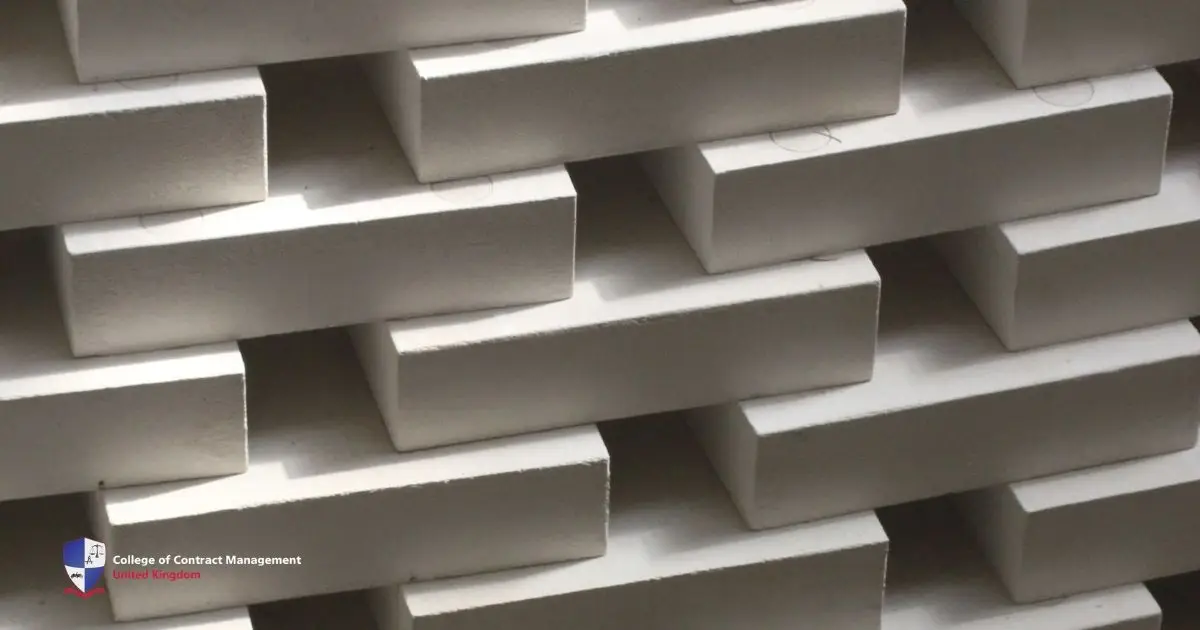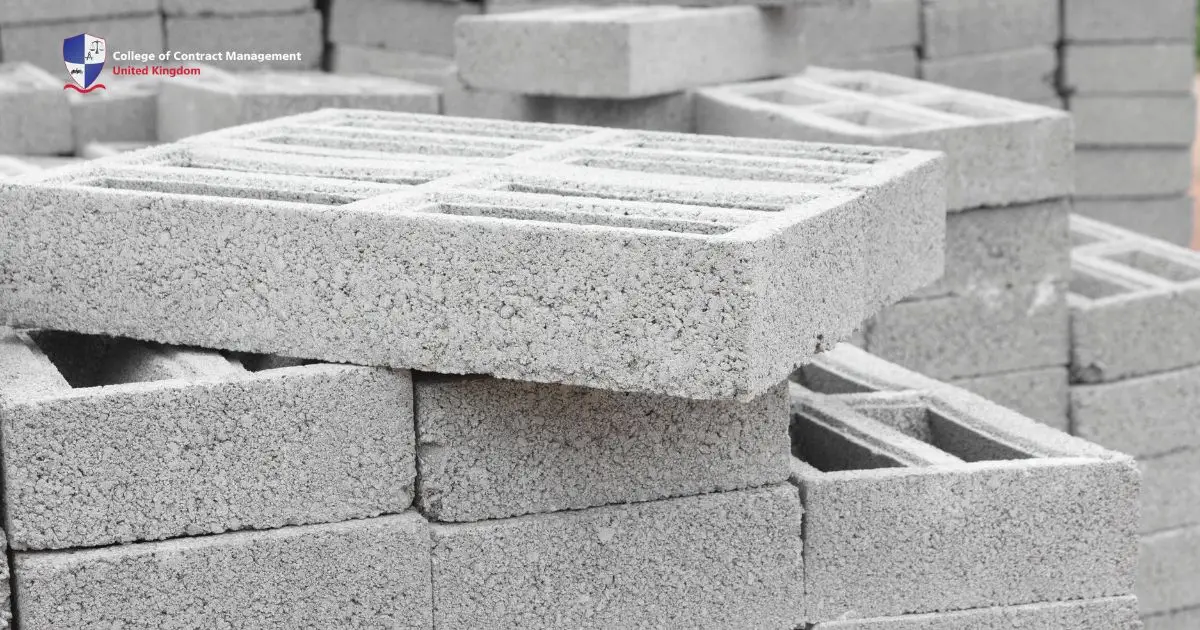In the UK construction industry, a block is a crucial component of building projects. They are versatile and durable, used for the foundation of many structures. From homes to commercial buildings, blocks provide strength and stability, making them indispensable. Understanding the different block types can help builders choose the right materials for their projects.
Choosing the right block can impact not only the cost but also the quality of a build. Each type of block has a specific feature that makes it suitable for certain applications. In this article, we will explore the common types of blocks used in construction and provide examples as well as explain their uses. Additionally, we’ll cover construction courses offered by the College of Contract Management to help aspiring professionals advance their skills.
What types of blocks are used in construction?
The types of blocks used in construction include concrete, hollow, lightweight, and a lot more. Few of these types work better in handling intense weather conditions. On the other hand, there are others which more commonly used in specific structures. With the right types in use, buildings can remain intact and durable regardless of the weight or temperature they’ll be subjected to.
To better identify which is the right one for your building project, it’s important to know the use cases of a construction block. Here, we’ll delve into the block types and discuss their usefulness in detail.
Concrete Blocks
Many building projects make use of this type of block. Its composition of cement, sand, and aggregates makes it strong and durable. Typically, this block measures 440mm x 215mm x 100mm and is ideal for constructing load-bearing walls. Their versatile nature and solid structure make them a popular choice for both residential and commercial buildings.
This block type comes in different sizes and densities, offering flexibility for various projects. A dense concrete block is best for load-bearing walls. With lightweight concrete ones, it's better for non-load-bearing applications. You'll commonly see these used in partitions.
Aerated Concrete Blocks
An aerated concrete block is lightweight and perfect for various construction projects. They provide great thermal insulation thanks to the tiny air pockets formed in the mixture, which not only make the block lighter but also easier to manage. Because of these properties, they are a fantastic choice for internal walls and spaces where keeping the temperature comfortable is important, helping to save on energy costs.
An example of an aerated block is the Celcon block. These are often used in residential construction to reduce energy costs. In addition to their thermal properties, an aerated block is easy to cut and shape, which makes them ideal for projects requiring precision. They also offer soundproofing benefits, a significant advantage in urban areas.
Engineering Blocks
An engineering block is dense, durable, and designed for use in high-load areas. Retaining walls, basements, and other structures requiring extra strength commonly use these. This block resists water and frost, making it even more ideal for tough environments.
An example of an engineering block is the Class A block. Damp-proof courses commonly use this block type. Engineering blocks are available in Class A and Class B categories, with Class A offering higher strength. They are often used in infrastructure projects such as bridges and tunnels where durability is critical.
Lightweight Blocks
A lightweight block is manufactured using lightweight aggregates such as expanded clay or pumice. They are easy to transport and handle, making them popular for projects where speed and efficiency are priorities. Partition walls and other non-load-bearing applications are common uses of this block type.
An example is a lightweight aggregate block, commonly found in interior wall construction. A lightweight block also provides good thermal and sound insulation. They are an eco-friendly option, as their manufacturing process often uses recycled materials. This makes them a sustainable choice for modern construction projects.
Facing Blocks
A facing block is versatile in terms of design. They can be used to create visible areas of a building where appearance matters, such as exterior walls or feature walls. These blocks come in different textures and colours to suit design needs.
An example is a split-face block, which has a rough, textured surface. Commercial buildings commonly use these for their decorative appeal. This is due to how this block adds a unique touch to the overall look when used in creating patterns or contrasts in a building's exterior. This block type is a popular choice for both residential and commercial projects.
Hollow Blocks
This type of block has hollow cavities, which makes it lighter and more economical. They are often used in large-scale projects and are ideal for reducing the weight of a structure while maintaining strength. This kind of block also improves thermal and sound insulation. An example of this is a standard hollow concrete block.
A hollow block is versatile. A few of their uses include load-bearing and non-load-bearing walls. Their design allows for easy installation of electrical conduits and plumbing, making them a practical choice for modern construction.
Insulated Blocks
An insulated block is designed to improve a building’s energy efficiency. This block type has a layer of insulation material, such as polystyrene or polyurethane, embedded within them. They are often used in external walls to meet strict energy efficiency standards.
An example is an insulated concrete block. Using insulated an insulated block can significantly reduce heating and cooling costs. They are preferred for eco-friendly projects and buildings aiming for high-energy performance certifications.
Concrete Bricks
These are smaller than traditional blocks but offer similar benefits in terms of strength and durability. Garden walls, pathways, and ornamental use are prime examples of its use in decorative applications.
An example is a standard concrete brick. Concrete bricks are available in various colours and finishes, making them a versatile option for adding character to a project. They are also highly resistant to weathering and require minimal maintenance.
Importance of choosing the right blocks for your build
Having the right set of blocks can make all the difference in the outcome of a construction project. Even with sudden incidents such as earthquakes, heavy rains, or just the test of time alone, you can ensure the building remains standing. After all, an important aspect of a building is to keep its inhabitants safe from harm. Other than that, with the proper materials, you’ll get to cut down on costs, all while keeping the property values high. Buildings focusing on durability, aesthetics, and sustainability tend to have a higher market value.
However, knowing which block type is best for your project isn’t enough. You’ll also need to reach out to expert builders to get your work done in the best conditions. But if it’s a project you’re planning to do yourself, it’s important to have the right training.
Construction courses at the College of Contract Management
The College of Contract Management offers various courses to help you build a strong foundation in the construction industry. These courses are designed for professionals at all levels, from beginners to experienced individuals looking to upskill. Here are some of the construction-related courses available:
- Diploma in Construction Management: Learn about managing construction projects, including planning, scheduling, and budgeting. This course is ideal for aspiring project managers and site supervisors.
- Site Management Safety Training Scheme (SMSTS): Understand health and safety regulations for managing construction sites. This course is essential for site managers and supervisors.
- Advanced Diploma in Quantity Surveying: Develop skills in cost estimation of building materials such as blocks, budgeting, and financial management for construction projects. This course is perfect for those looking to specialise in construction finances.
Benefits of Construction Courses
Enrolling in these courses offers many benefits. You will gain practical knowledge usable directly in your projects whether they use blocks or focus on other building materials. The courses are taught by industry experts, ensuring you learn from the best in the field.
Additionally, these qualifications are recognised by employers across the UK and globally. Whether you’re looking to advance your career or specialise in a particular area, these courses can help you achieve your goals.
Why choose the College of Contract Management?
Joining the College of Contract Management can open doors to exciting career opportunities in the construction industry. With expert tutors and flexible learning options, the College is an excellent choice for anyone looking to advance their career.
By enrolling in these courses, you’ll gain practical knowledge and industry-recognised qualifications. This can help you stand out to employers and gain the opportunity to work on more complex building projects. Whether you’re new to construction or an experienced professional, the College of Contract Management has a course to suit your needs.
Final Thoughts on Blocks and Courses
Blocks play a vital role in construction, offering strength, versatility, and efficiency. From concrete block types to lightweight and facing block types, understanding their features and applications can make a big difference in your projects.
If you’re considering a career in construction or want to improve your skills, enrolling in a course at the College of Contract Management is a smart choice. Start your journey today and build a solid foundation for your future.





